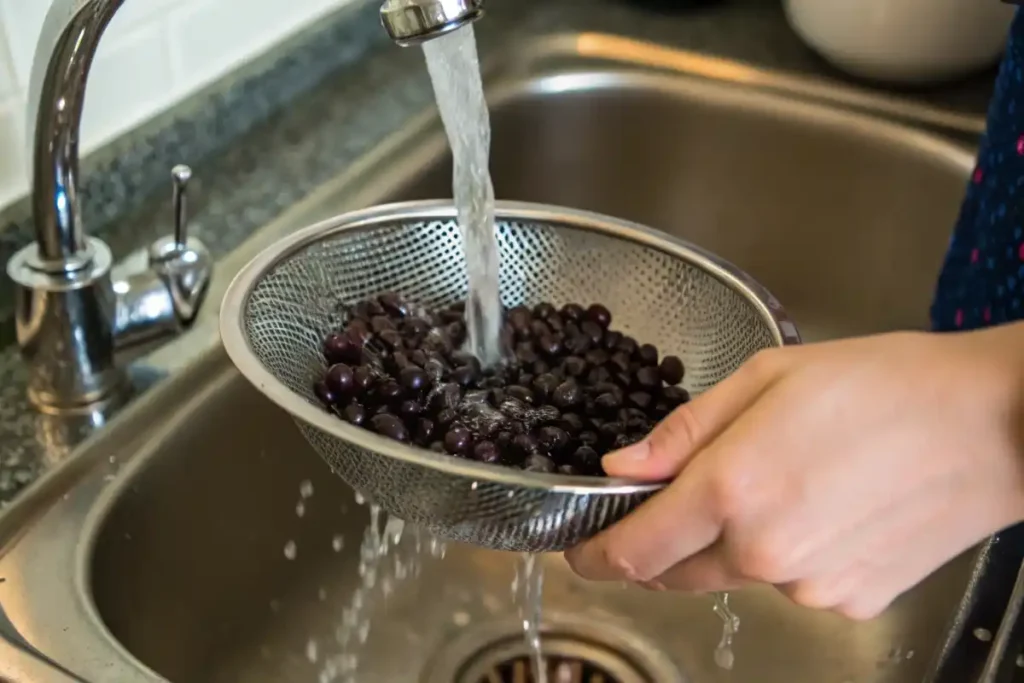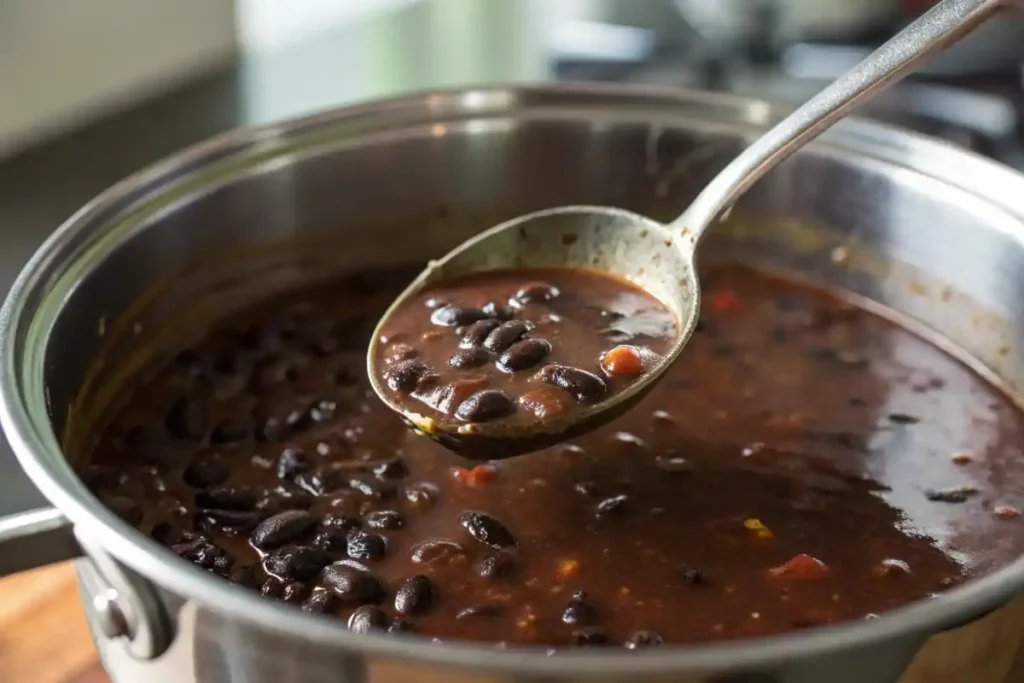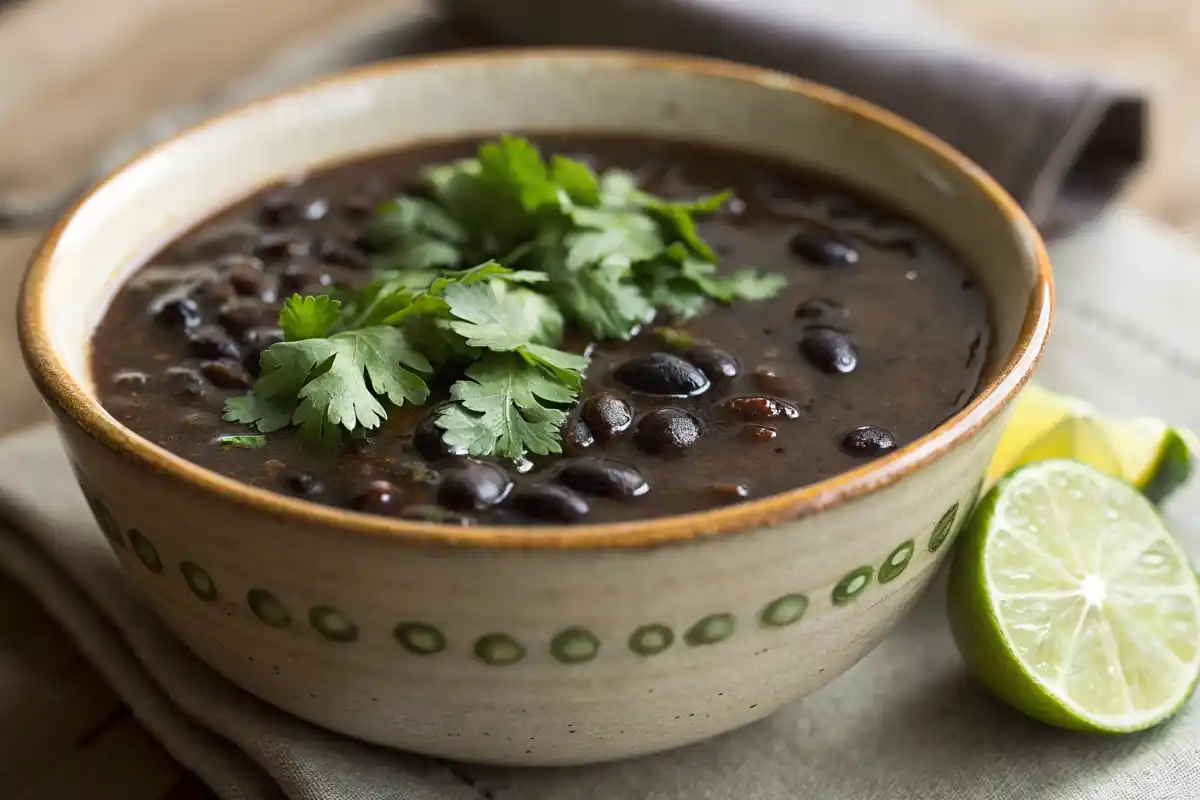Should I rinse canned black beans for soup? It’s a question many home cooks find themselves asking while holding a can of these versatile beans. You’re not alone. This question has sparked countless debates among home cooks, foodies, and even professional chefs. The good news? You’re about to get all the answers you need.
Jump ahead to:
Canned Black Beans and Their Use in Soups
What Are Canned Black Beans?
Canned black beans are a pantry superhero. These pre-cooked, ready-to-use beans are not only convenient but also packed with flavor and nutrients. You’ll find them soaking in a thick liquid, often called aquafaba, which is a mix of water, salt, and starches from the beans. But here’s the million-dollar question: should you keep or rinse away this liquid? Let’s dig in.
Why Are Black Beans Popular in Soup Recipes?
Black beans are like the dependable friend of the culinary world. They bring a hearty texture, earthy flavor, and a rich color to soups. Plus, they’re versatile. From spicy chili to creamy black bean bisque, these beans can adapt to almost any recipe. But their star quality lies in their ability to bulk up your dish without breaking the bank. If you’ve ever noticed a purple hue in your black bean soup, you might wonder why that happens don’t worry, there’s a scientific reason behind it!
Nutritional Value of Canned Black Beans
Black beans aren’t just tasty they’re good for you too! Here’s a quick rundown of their nutritional profile:
| Nutrient | Per 1/2 Cup (Drained) |
|---|---|
| Calories | 114 |
| Protein | 7.5g |
| Fiber | 7g |
| Sodium | 461mg (without rinsing) |
| Iron | 1.8mg |
Pretty impressive, right? But keep in mind that the sodium content can vary depending on the brand. That’s why rinsing often comes up in discussions especially if you’re watching your salt intake. If you’re curious about the health benefits of this ingredient, check out whether black bean soup is good for you.
To Rinse or Not to Rinse: A Common Dilemma
What Does Rinsing Canned Black Beans Mean?
When we talk about rinsing canned black beans, we mean pouring the beans into a colander or strainer, running them under cold water, and shaking them around until the thick, starchy liquid is gone. It’s quick, easy, and doesn’t require any special tools. But is it always necessary?
Why Is This a Frequently Asked Question?
It’s all about that liquid. Some people see it as a salty sludge that ruins the flavor of their soup, while others view it as a magical elixir that thickens and deepens the taste. The truth? It depends on your recipe, personal preference, and dietary needs. Let’s break it down further.
“Rinsing canned black beans is like deciding whether to keep the wrapping paper after opening a gift. It depends on whether the packaging adds to the experience or just gets in the way.”

Popular Opinions: Chefs vs. Home Cooks
Chefs often fall into two camps. Some argue that the liquid adds flavor and consistency, especially in hearty soups like chili. Others believe it muddles the taste and prefer starting with a clean slate. Home cooks? They’re split too, with many choosing to rinse to control salt and avoid a cloudy soup base.
Should I Rinse Canned Black Beans for Soup? Benefits You Need to Know
Reduced Sodium Content
Here’s the thing about canned beans they’re often high in sodium. If you’re trying to eat healthier or manage conditions like high blood pressure, rinsing can significantly cut down on salt. Studies show rinsing canned beans can reduce sodium by up to 41%. That’s a lot, right?
Improved Flavor and Texture
Let’s be honest sometimes that bean liquid tastes… funky. It can overpower delicate flavors in your soup, leaving you with something less appetizing. Rinsing gives you a clean slate, letting your seasonings and broth shine without interference.
Eliminating Unwanted Additives
Ever looked at the ingredients on a can of black beans? You might see words like “calcium chloride” or “disodium EDTA.” These preservatives help maintain the beans’ texture and color but aren’t always necessary for your recipe. Rinsing removes some of these extras, giving you a more natural dish.
“Think of rinsing as hitting the reset button. It’s your way of customizing the beans to fit your soup’s vibe.”
We’ve covered the basics of why you might want to rinse canned black beans. But what about the flip side? In the next part, we’ll explore the downsides of rinsing and when it’s okay to skip this step altogether. Stay tuned for more insights, tips, and tricks to take your black bean soups to the next level!
Downsides of Rinsing Canned Black Beans
Losing Nutrients
Rinsing canned black beans might make them taste fresher, but it also comes at a small cost. The liquid they’re packed in, often called aquafaba, contains nutrients like iron and potassium that leach out of the beans during processing. When you rinse it away, you lose some of these valuable nutrients.
Think of it this way: it’s like draining the juice from a canned fruit salad. You get the fruit, but you’re throwing away some of the sweetness and nutrients that came with it.
Missing Out on the Thickening Effect
The liquid in a can of black beans isn’t just salty water it’s starchy and thick. If you’re making a soup that needs a creamy texture, skipping the rinse can give your dish a rich, hearty base. The starch acts as a natural thickener, especially useful in recipes like black bean chili or Mexican-style soups.
“That bean liquid is like liquid gold for soup lovers don’t underestimate its power to add body and flavor.”
Time and Effort Involved
Let’s face it: rinsing beans isn’t exactly hard, but it’s one more thing to do. When you’re juggling pots on the stove, chopping veggies, and keeping an eye on the clock, every step counts. If your recipe can work without rinsing, why add another task to your list?
When to Rinse Canned Black Beans for Soup
Light and Refreshing Soups
If your goal is a soup with a clear broth, like a black bean and vegetable soup, rinsing is the way to go. The bean liquid can make the broth cloudy and affect the final presentation. Plus, for lighter dishes, you’ll want the cleanest flavor possible, free of the extra salt and starch.
Recipes Requiring Clean Flavors
Are you making a black bean soup with citrusy notes or fresh herbs? The starchy liquid might overpower these delicate flavors. Rinsing ensures your soup has a bright, crisp taste that doesn’t get muddled by the richness of the bean liquid.
Dietary Concerns: Sodium and Additives
If you’re keeping an eye on your sodium intake, rinsing is a no-brainer. It’s also a good idea if you’re avoiding additives found in some canned goods. The quick rinse washes away a significant amount of sodium and other extras, making the beans a healthier choice.
“Rinsing canned beans is like decluttering your closet it clears out the unnecessary stuff so you can focus on the essentials.”
When to Skip Rinsing Canned Black Beans for Soup
Thick and Creamy Soups
If you’re aiming for a thick, luxurious soup, the bean liquid is your friend. It blends beautifully with other ingredients and gives your dish a velvety texture without needing extra cream or thickeners.
Recipes Leveraging Bean Liquid (Aquafaba)
Did you know that the liquid in canned beans can be used as a vegan substitute for eggs in certain recipes? While that’s more common with chickpeas, black bean liquid can work in a pinch, especially in soups where you need a bit of extra binding or richness.
Time-Saving Cooking Tips
In a rush? Skip the rinse and pour the beans straight into your pot. Sure, the flavor might be slightly saltier or starchier, but if you’re in a hurry, it’s a shortcut worth taking. Just adjust your seasoning accordingly and taste as you go.

If your soup turns out bitter, it could be due to overcooked beans or certain seasonings. Learn more about why black bean soup might taste bitter and how to fix it.
Practical Steps to Rinse Canned Black Beans
Tools You’ll Need
- A colander or strainer
- Running water
- A bowl to catch the liquid (if you want to save it)
Step-by-Step Rinsing Guide
- Open the can and pour the beans into a colander.
- Rinse the beans under cold running water.
- Shake the colander gently to ensure all the liquid is washed away.
- Let the beans drain for a minute or two before adding them to your recipe.
Pro Tips for Efficient Rinsing
- If you’re short on time, rinse the beans while the broth is simmering.
- Want to save the bean liquid for later? Catch it in a bowl before rinsing and store it in the fridge for up to three days.
- Use a fine-mesh strainer if you’re working with small or broken beans to avoid losing any down the drain.
“Rinsing canned beans is simple, but it’s a small step that can make a big difference in the final dish.”
Now that we’ve covered the pros and cons of rinsing, along with when to rinse or skip it, you’re well-equipped to make the right choice for your recipe. In the next part, we’ll dive into delicious black bean soup recipes, common problems, and handy tips to make your soup absolutely irresistible.
Creative Soup Recipes Using Canned Black Beans
Classic Black Bean Soup
This timeless recipe is a crowd-pleaser, perfect for chilly nights or quick weeknight dinners. Packed with flavor and nutrition, it’s as simple as it is satisfying.
Ingredients
| Ingredient | Quantity |
|---|---|
| Canned black beans | 2 cups (rinsed or unrinsed) |
| Onion (diced) | 1 medium |
| Garlic (minced) | 2 cloves |
| Vegetable broth | 4 cups |
| Ground cumin | 1 tsp |
| Chili powder | 1/2 tsp |
| Lime juice | 1 tbsp |
| Salt and pepper | To taste |
Instructions
- Heat a large pot over medium heat and sauté the onion and garlic until soft and fragrant.
- Add the cumin, chili powder, and a pinch of salt, stirring to combine.
- Stir in the black beans and vegetable broth. Bring to a boil, then reduce to a simmer for 15 minutes.
- Use an immersion blender to puree part of the soup for a creamy texture, or leave it chunky for a heartier feel.
- Finish with lime juice and adjust seasoning as needed. Serve hot with toppings like sour cream, avocado, or fresh cilantro.
Spicy Black Bean Chili
Want to kick things up a notch? This chili recipe brings bold spices and a touch of heat to your bowl.
Ingredients
Follow the base ingredients above, adding:
- 1 diced jalapeño
- 1 cup diced tomatoes
- 1 tbsp smoked paprika
- 1/2 tsp cayenne pepper
Cook as described in the classic soup, but simmer longer about 30 minutes for a deeper flavor.
Black Bean and Vegetable Minestrone
For a veggie-packed twist, add zucchini, carrots, and spinach to your soup base. It’s a nutritious, flavorful option for a family meal.
Common Problems When Using Canned Black Beans in Soup
Overly Salty Soup
Should I rinse canned black beans for soup if I want to avoid overly salty results? If you’ve skipped rinsing and your soup tastes too salty, don’t worry. Simply add a peeled potato to the pot and let it simmer for 10-15 minutes it will absorb some of the excess salt and rescue your dish.
Cloudy Soup Broth
If you skipped rinsing and don’t love the look of your soup, consider blending part of it to mask the cloudiness. Alternatively, add a splash of fresh broth to brighten the dish.
Beans That Fall Apart
Overcooking canned beans can turn them mushy. To avoid this, add the beans during the last 10 minutes of cooking, especially if you’ve rinsed them.
Solutions and Tips for the Perfect Black Bean Soup
Balancing Flavors in Your Soup
Achieving the perfect taste is all about balance. If your soup is too salty, add acid like lime juice. Too bland? A sprinkle of chili powder or smoked paprika can work wonders.
Achieving the Right Consistency
Whether you like it creamy or chunky, the choice is yours. Blend a portion of the soup for a velvety texture, or leave the beans whole for a rustic vibe. Pro tip: use a potato masher for something in between!
Enhancing Nutrition Without Sacrificing Flavor
Add a handful of spinach or kale in the last five minutes of cooking. It’s an easy way to sneak in extra nutrients while complementing the beans’ earthy flavor.
“Soup-making is like creating art you can adjust colors (flavors) and textures to match your mood.”
Frequently Asked Questions About Canned Black Beans
Can I Use Canned Black Beans Without Rinsing?
Absolutely! Just be mindful of the extra salt and adjust your recipe accordingly. For thick soups, the liquid can actually be a bonus.
What Happens if I Don’t Rinse the Beans?
Your soup might be saltier and have a slightly different texture, but it’s still safe and tasty. It’s all about personal preference.
Are There Any Alternatives to Rinsing?
If you’re in a rush, simply drain the beans without rinsing. It cuts down on the salt and starch without taking extra time.
Conclusion: Making the Right Choice for Your Soup
Should I rinse canned black beans for soup? By understanding the benefits and drawbacks, you can make the right choice for delicious, healthy soups. By understanding their benefits and drawbacks, you can make informed choices that suit your recipe and taste preferences.
So, the next time you’re holding that can of black beans, you’ll know exactly what to do. Now go forth and make the most amazing purple black bean soup ever!

